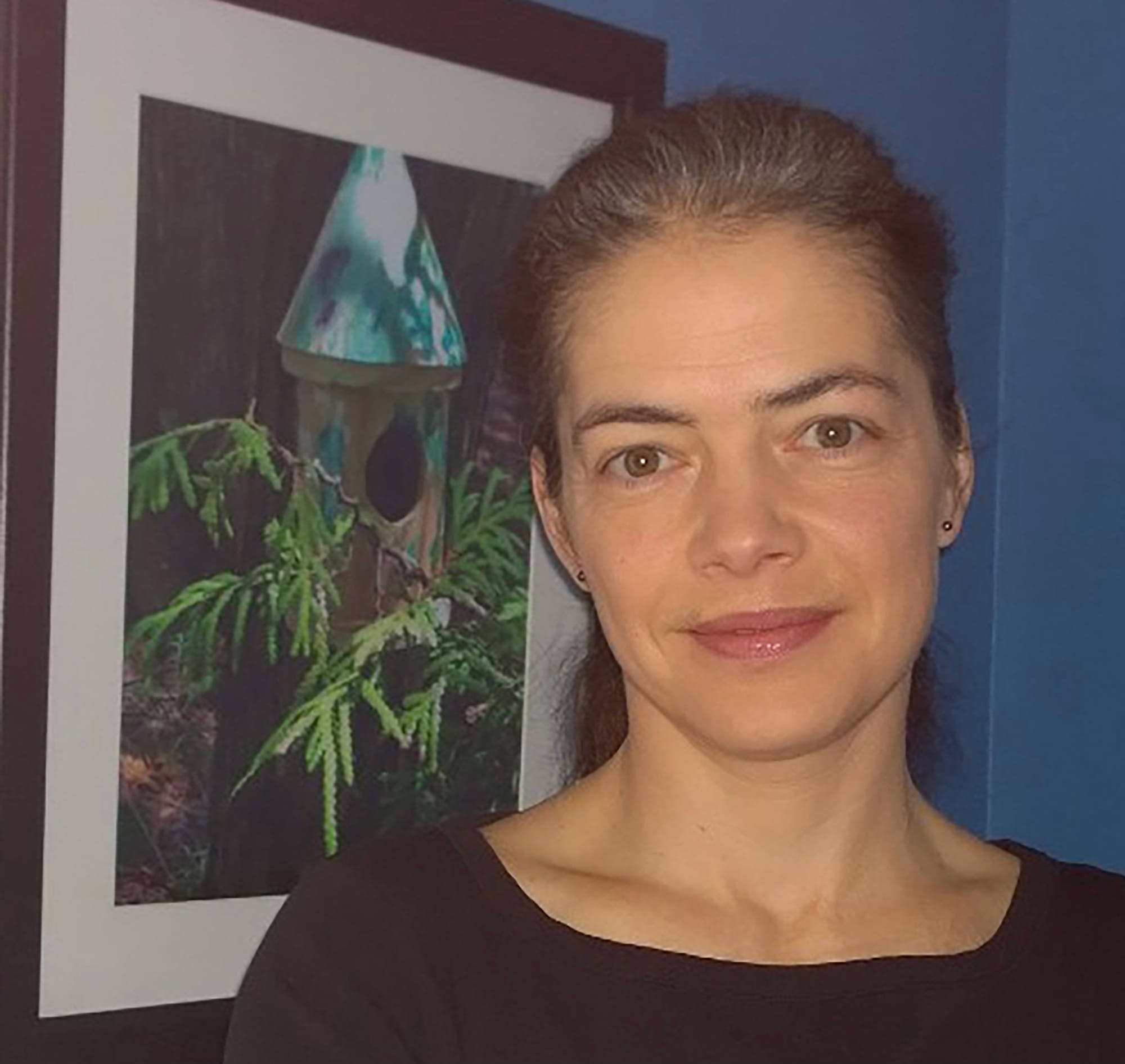It was a simple plan. Fly to Ireland, compete in a karate tournament, stay an extra day to visit the graves of various ancestors in an around Belfast, fly back home. There was no need to get lost anywhere.
We arrived earlier than expected, because our flight was one time and nobody lost our luggage. We were dazed, standing there looking at each other with our bags on the trolley and nothing to wait for. It felt like we’d won the lottery but were now living in a world where money had no value.
“Slept OK on the flight?” I asked, unnecessarily. The grey undertone of the skin below his stubble told the whole story. He laughed, like he always does when something hurts.
My theory about jet lag, which I have now tested several times, is that you should ignore it. You fly when you fly, try to sleep on the plane if you can (you can’t) and when you get where you’re going, it’s whatever time it is. To wit, in this particular instance, noonish. You don’t go to bed at noonish, even when you’ve already been up for 46 hundred hours. You think thoughts of lunch, hungry or not. Under no circumstances should you allow yourself to lie down until at least 7 pm. It was going to be a long afternoon.
The lady trapped in the plastic box behind the security barrier was visibly disturbed by my companion’s mirth. She probably never saw anyone crack so much as a smile as they went through customs. Certainly she could recall nothing in the training manual about that. Does laughter make a slightly dishevelled middle-aged guy with a grey skin tone under his stubble more suspicious, or less? For reasons better known to herself, she waved us through, stamping our passports the way I suspected her of punching a ball of dough before rolling it to make crumpets.
“Food?” he asked. We hadn’t eaten in several time zones and it was now, as previously alluded to, noonish.
“Cigarette first.” By the time we were crammed into our rental peanut shell of a car with its gleaming burgundy plastic interior, we thought we were ready for an adventure.
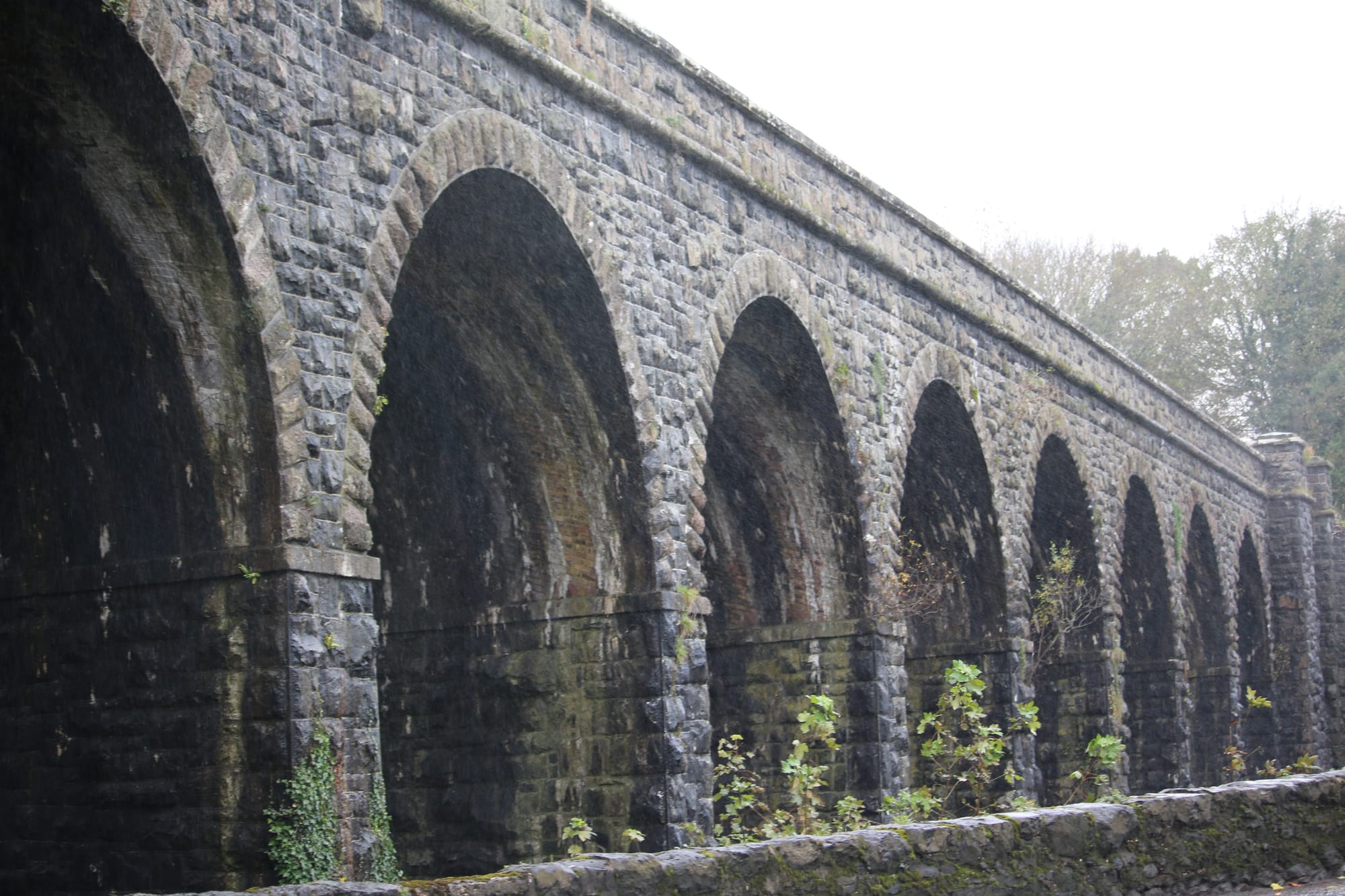
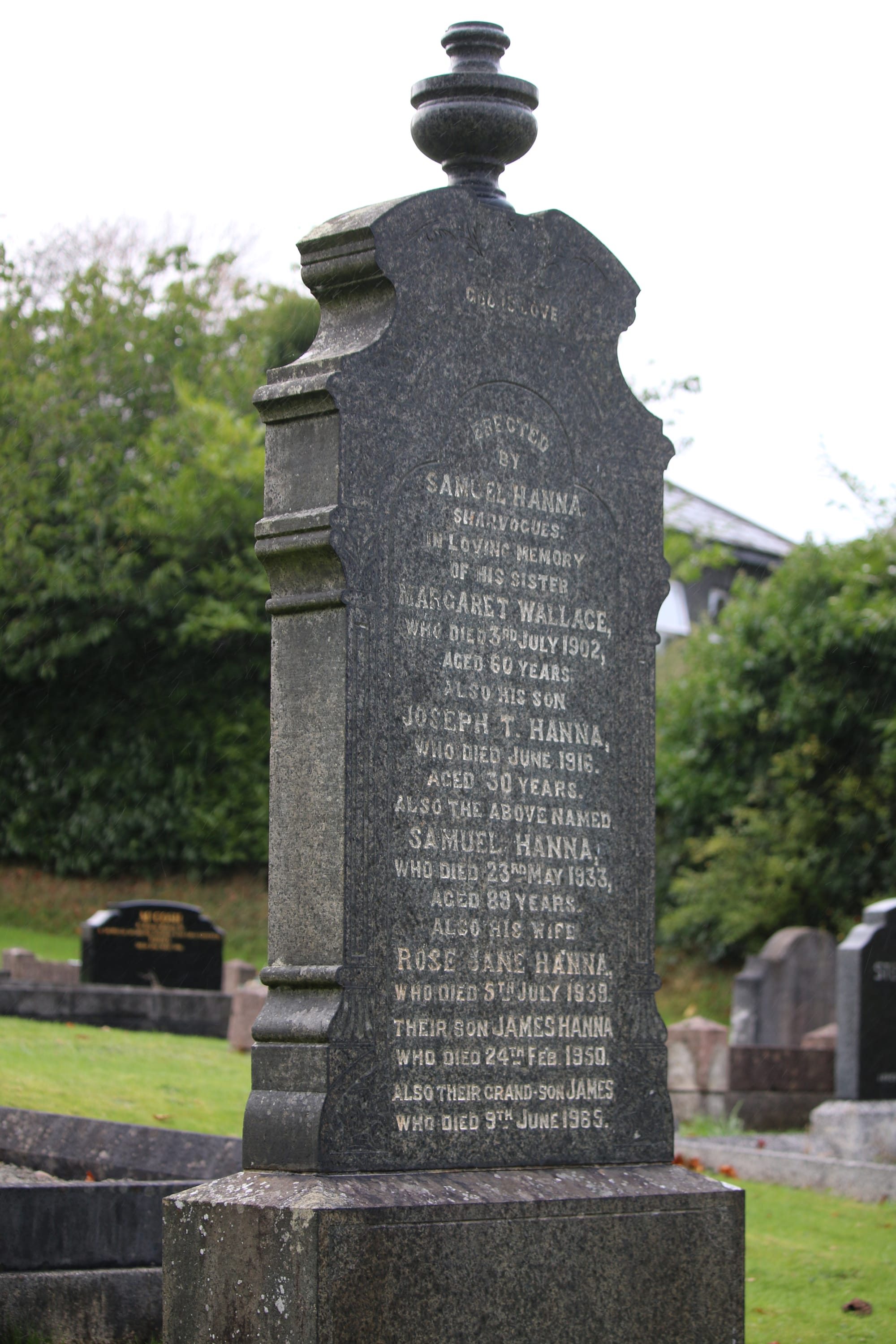
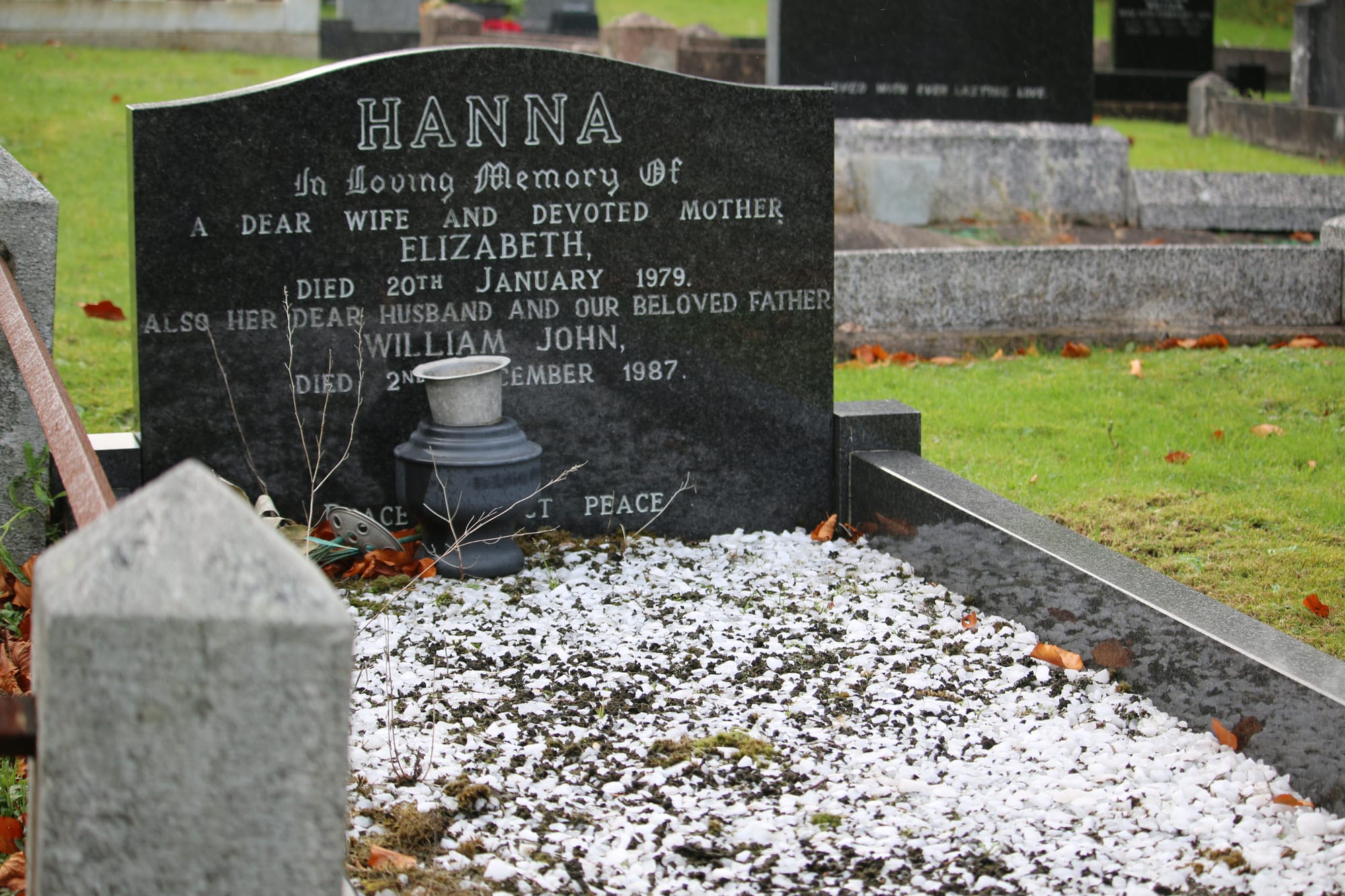
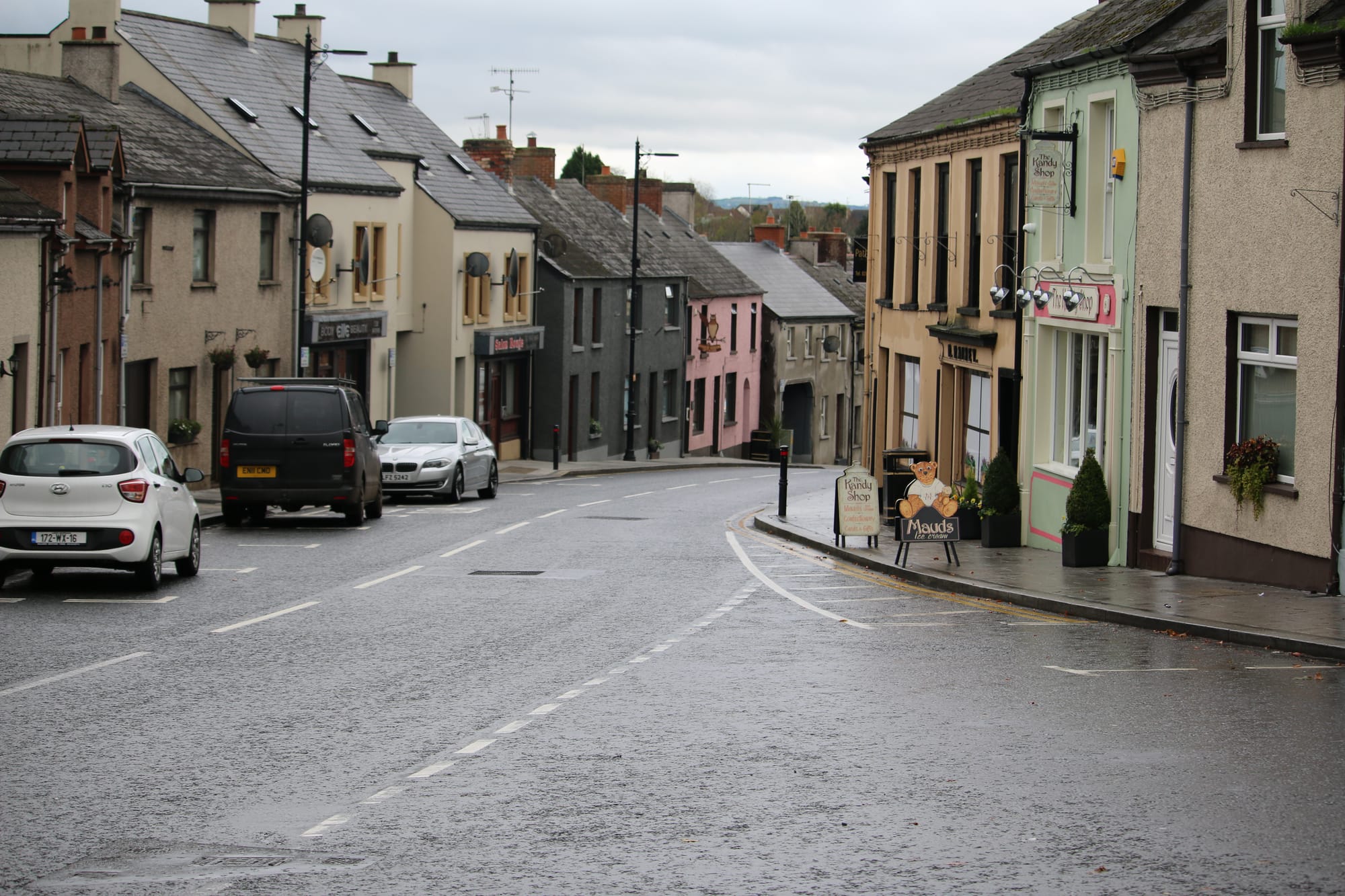
Randalstown, Northern Ireland, where we said hey to the bones of distant relatives. We’re pretty sure that was ‘em.
Our bags barely fit in the boot, we had to use all our creativity to not have them spill over into the backseat which was perilously close to the front seat. I would need all the elbow space available to drive. The car was newish, and it still smelled like the cleaner they used between customers. It hit you at the top of your nostril like someone had shoved a Lysol wipe up your snout. Everything looked like polished plastic.
I sat in the driver’s seat for a few minutes, to let my body absorb the unique logic that makes UK cars the exact opposite of American ones except for the gear shift. It still goes from first at the top left towards fifth at the top right. I guess it’s not meant to be understood. “You sure you can do this?” I want to say there was more concern than fear in his voice, but alas.
“Still want lunch?” The cigarette had killed my appetite. A great way to make weight the next day, I guess.
“Nah, let’s go see what this town has to say for itself.”
The first thing you do when you get to Dublin proper is go see the Book of Kells. We headed straight for it. Or rather, round the roundabouts for it. The part about the exhibit is, I’m sure, lovely as all hell but for two weary and badly jet-lagged travellers, it contained too much fine print to be enjoyable.
The reason you go see the Book of Kells isn’t for the book itself, but for the entire library upstairs from the museum portion. Trinity College has one of the most magnificent libraries I have ever seen. “Want coffee?” I said after a decent amount of oohing and aahing.
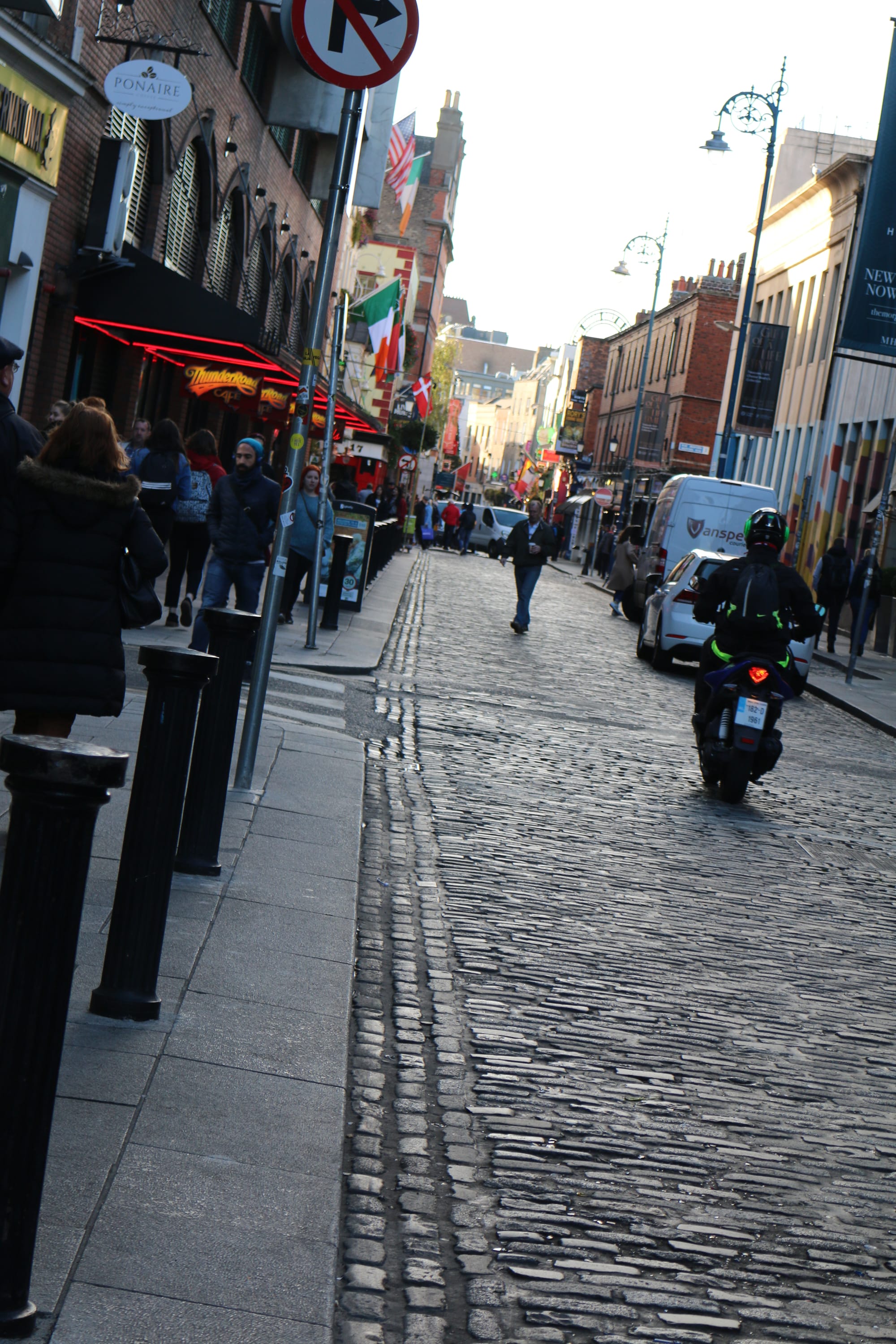
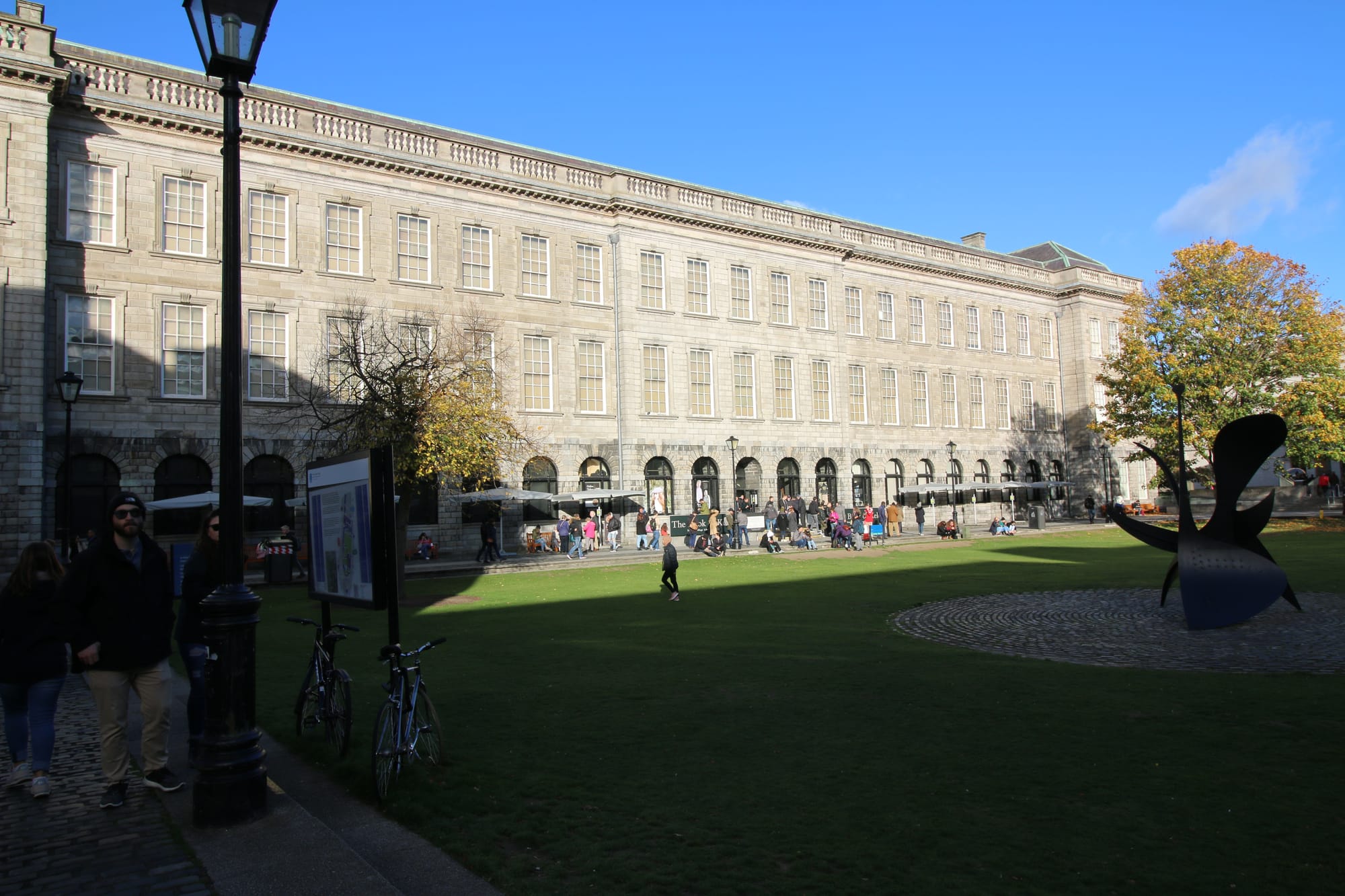
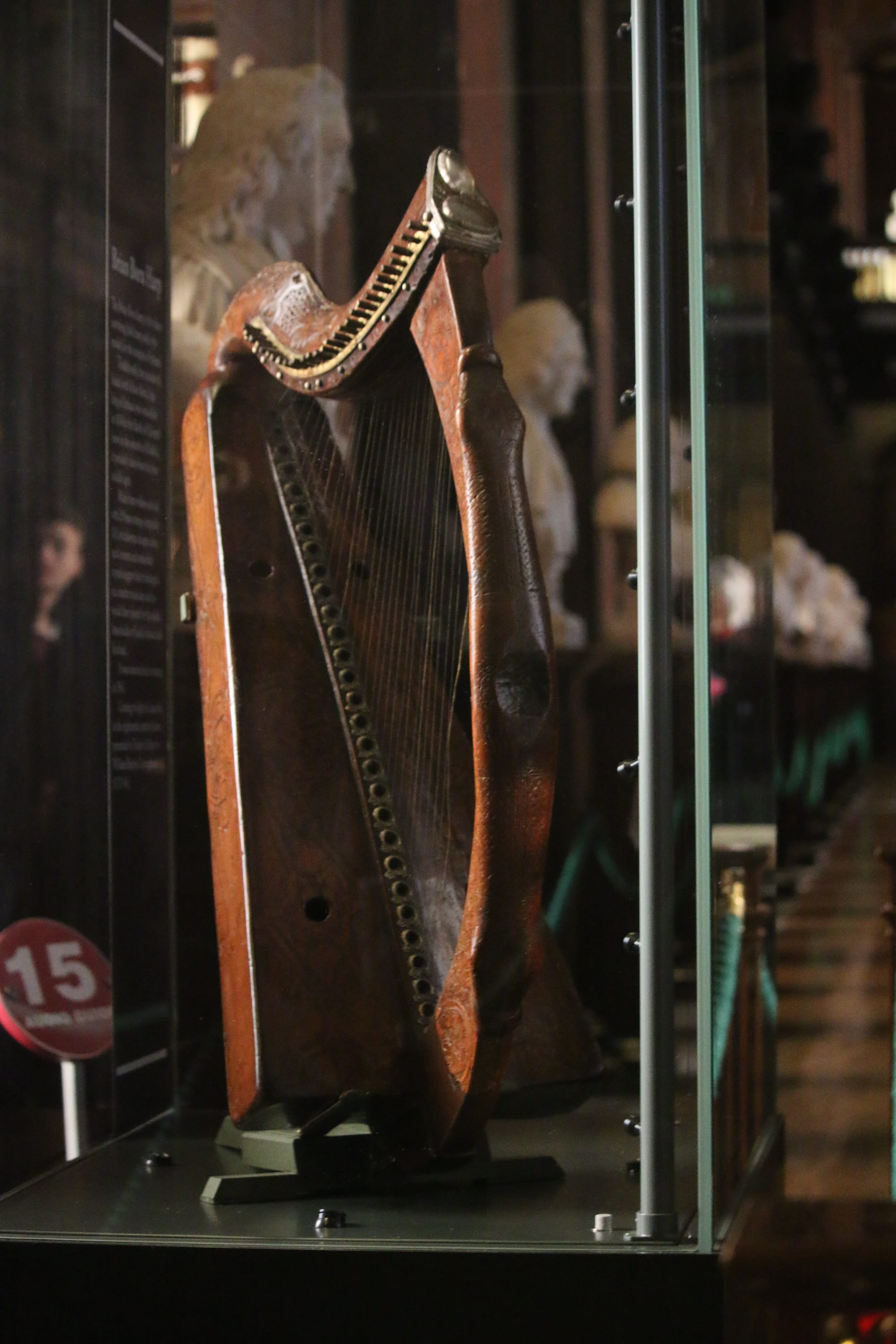
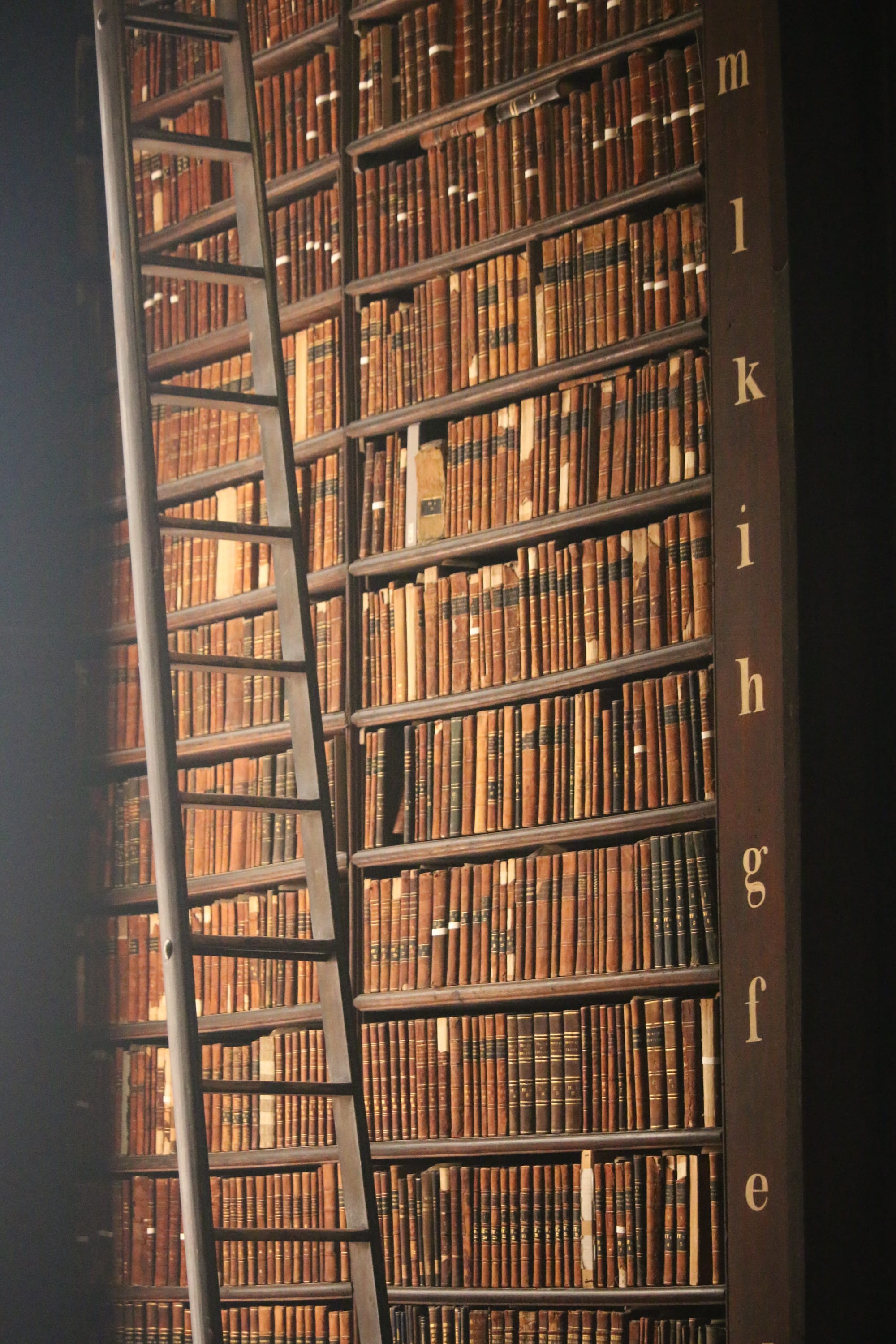

There comes a point in every transatlantic journey where the environment recedes and most of what you see is a reflection of what’s inside you. As we walked from Trinity College towards the Liffey river, on the cracked sidewalks, I could hear voices buzzing in my head. It was a jumble of stuff, most of it self-defeating. You have no idea what you’re doing. You’re probably lost, again. So you think you can keep that title of world champion by sightseeing instead of training? One step after another these phrases ricocheted inside my skull, and I wish I could give you a lovely account of the architecture I walked past but nope.
“Did you notice how many used syringes there are?” He asked, piercing the wall of noise between my ears.
“Eh? Where?” He pointed to the small space between two buildings, where residents had managed to cram three bicycles and a couch in what should have been a fire exit.
“There. I guess we’re in the not-so-nice part of town.”
European cities are built in circles, I’ve discovered. The limits between what’s considered nice and what could pass as slightly medieval skid row aren’t easy to see unless you grew up being reminded where they are. We crossed so many socio-economic lines between majestic old library and a decent coffee, without even realizing it. “Ah, there,” I said pointing at a sign in Italian. “This looks like it would have caffeine and clean toilets.” I needed both pretty badly, even at $12 for two latte.
Properly reinvigorated and with lighter bladders, we explored the riverbanks on the way back to our rental peanut shell. It was time to get closer to a room and a bed, I thought, looking forward to when it wouldn’t be too early to close the book on that particular day, whatever date it was.
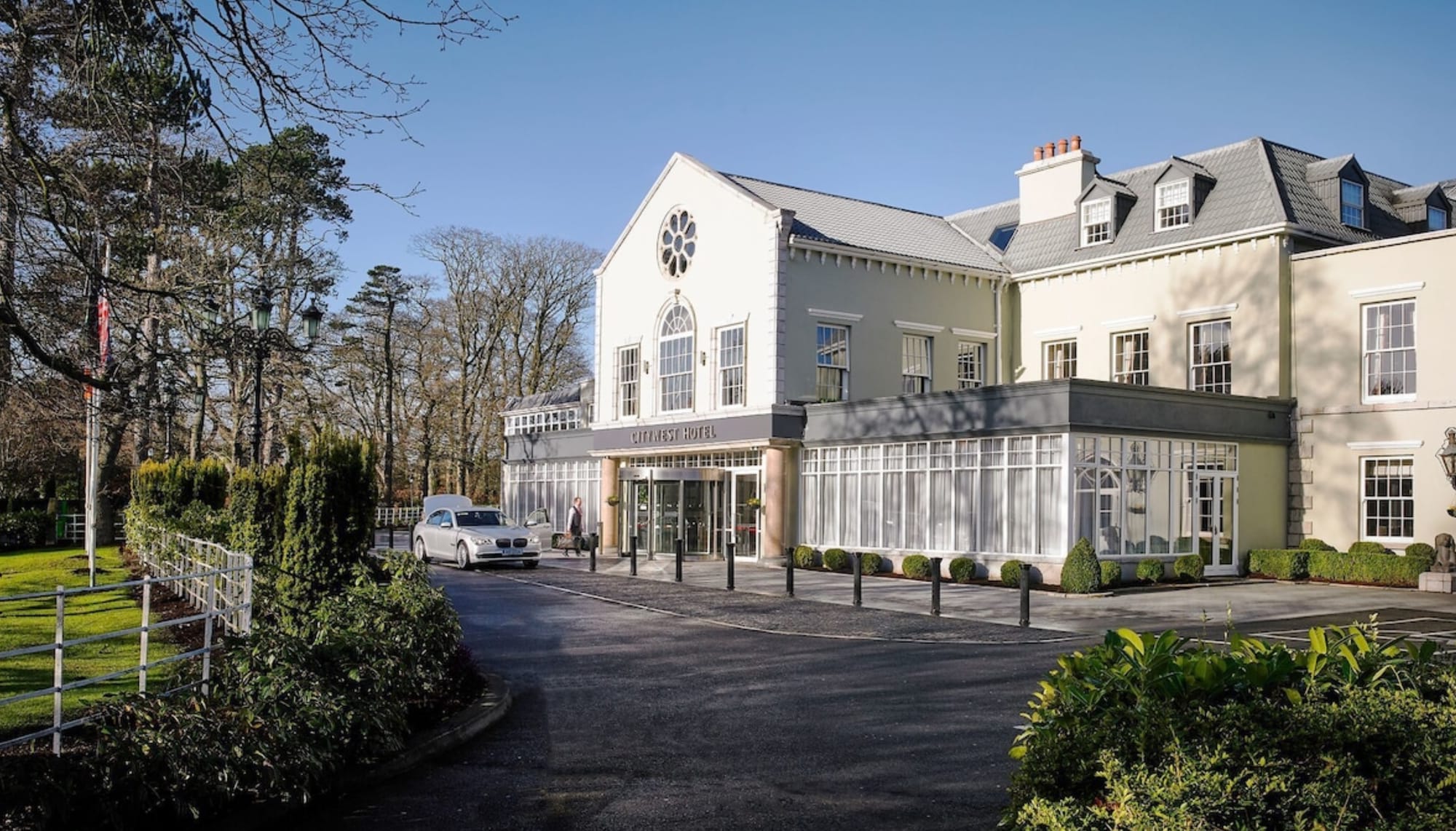
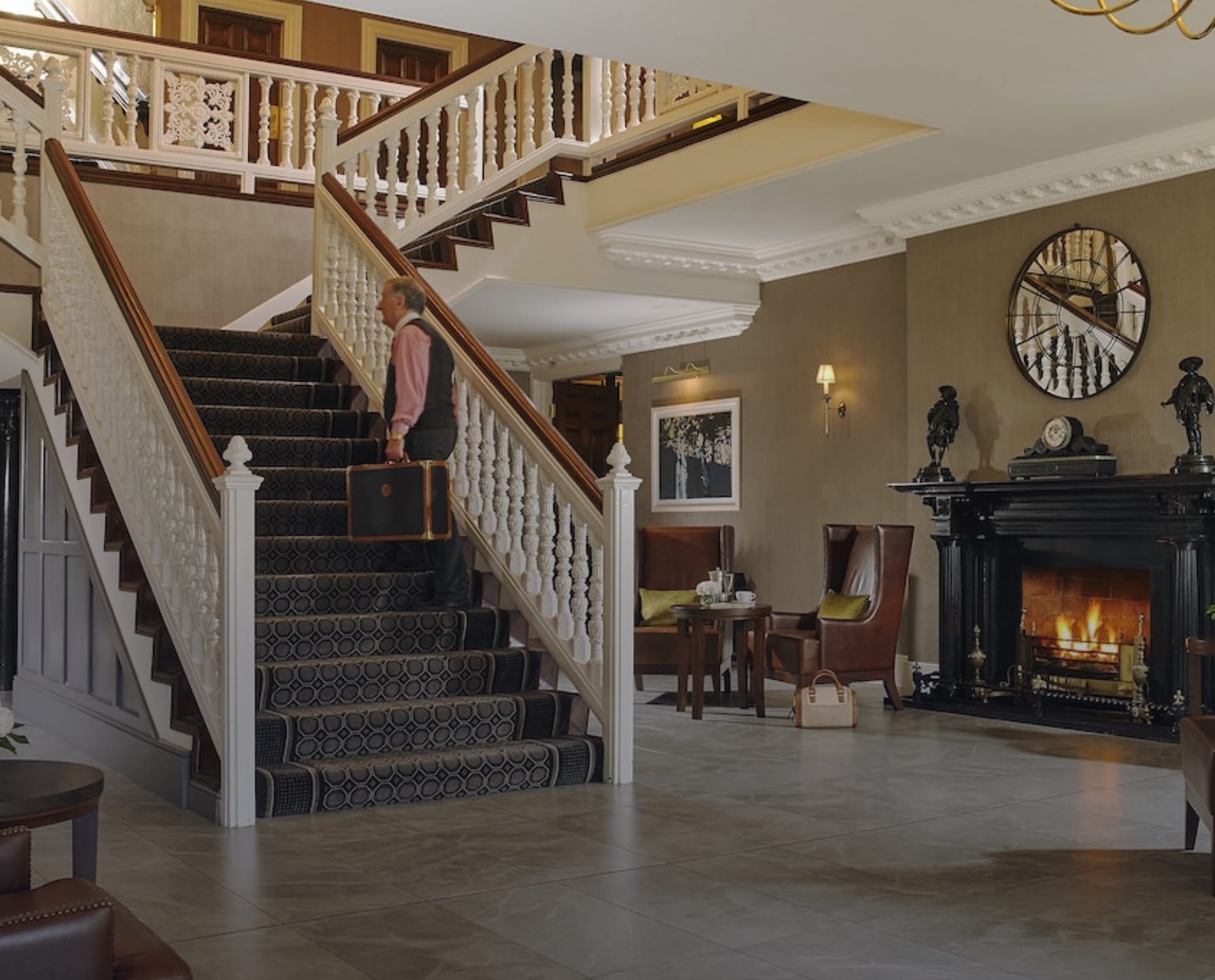
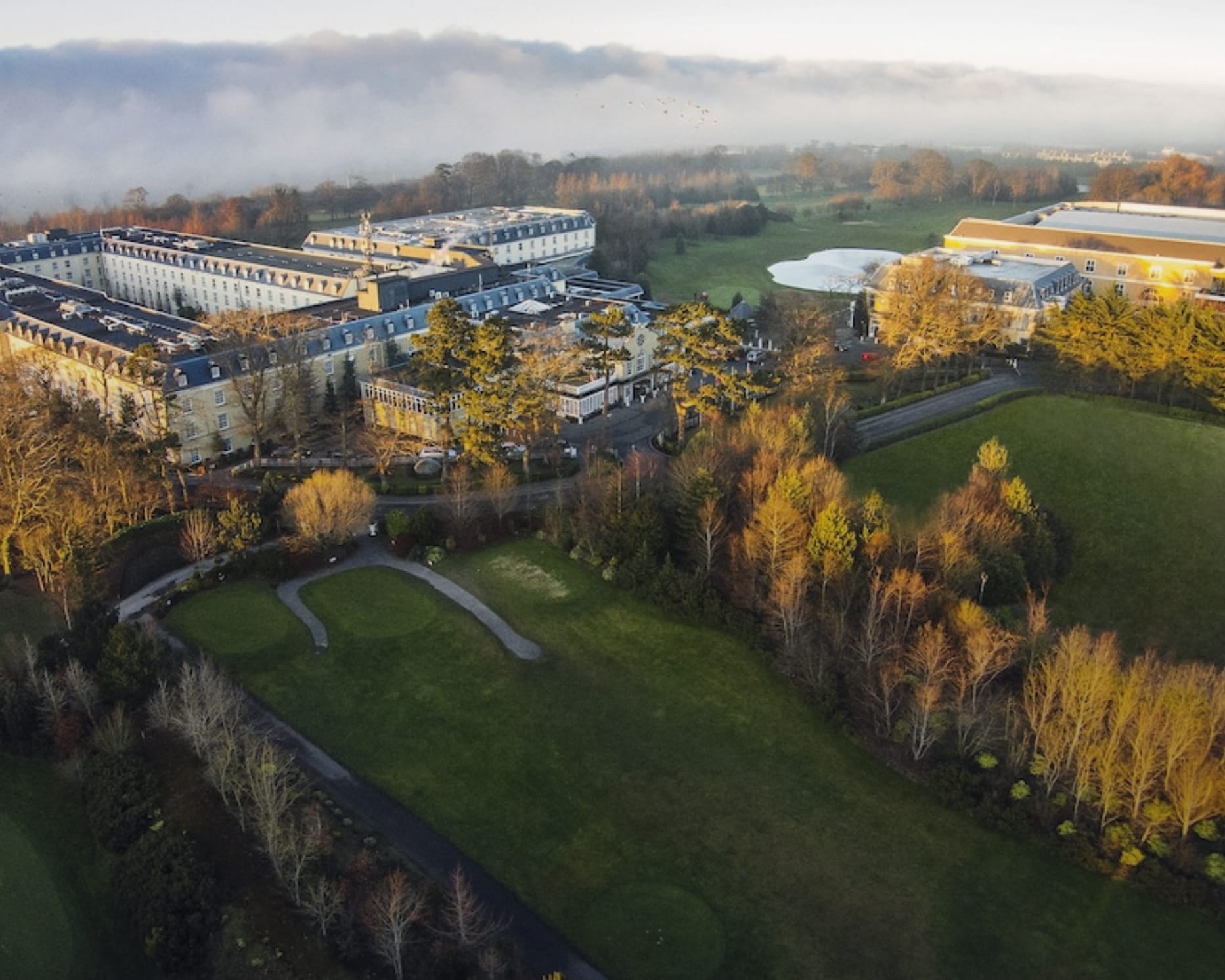
Photos shamelessly pilfered from the hotel’s marketing collection.
We were staying a little ways out of town, in a suburb called Citywest located — you guessed it — west of Dublin. That wasn’t very hard to predict, given that what’s located east of Dublin is the Irish Sea but I felt I’d earned a treat regardless.
Citywest hotel is a massive complex of castle-y buildings sparsely distributed around an impossibly lush golf course in an Irish green valley. The views are spectacular and you’d never guess you were barely half an hour outside the capital of an European country. Well, OK, sure, Ireland is not the biggest European country. Indulge me, would you?
The main building, where the hotel and — crucially — the pub are located looks exactly like the one in The Shining except, one hopes, without ghosts, dead bodies or maniacal writers. The corridors are endless, vast expanses of thick carpet, lights that go off when nobody’s around and many doors that seem to lead to untold mystery stories.
“It’s almost 4:30,” I said after we’d dropped our bags and took a few essentials out of same. “Time to hit the bar.” If he objected I didn’t hear it.
It was after my second Guinness that the idea of getting lost started to sound appealing. “We should sleep on it,” he said, being his reasonable self. “Just in case, you know.”
“You are not going to drive that far?!?” Kate gaped as she refilled the ridiculously tiny ceramic thing that passed as a cup with liquid the hotel hoped we’d believe was coffee. I was attempting to cure both jet lag and hangover with a generous application of blood pudding and broiled tomatoes. Don’t laugh, it’s remarkably efficient.
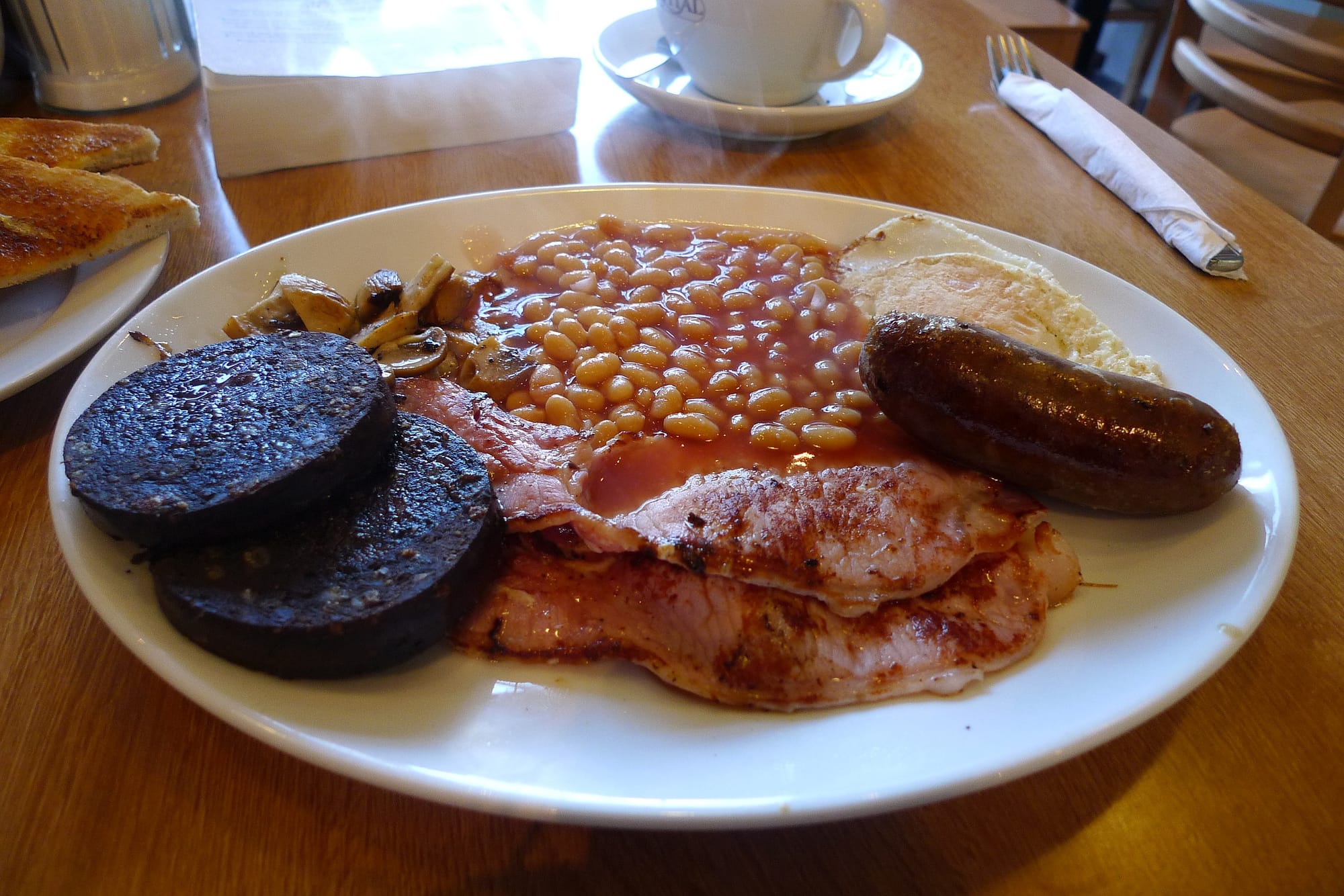
“Why not?” I wittily replied, a bit of egg yolk pooling in the corner of my mouth. “It’s only, what, a couple hundred kilometres?”
The breakfast room this early in the morning was particularly busy. And for some reason in Ireland people eat quietly. At least in the morning. It felt like a soundproof booth. The carpet was not covered in food like you’d find at the Holiday Inn. Heavy drapes hung around the windows that wrapped around the building. The sun, wow. I just streamed through everything. Outside, remnants of overnight fog and mist failed to dim the green of the valley. It’s hard to believe how many shades of one colour grass can hold without bursting.
Kate’s face was engaging and friendly, the perfect grandma. Not very tall, slightly round. In one hand she had a coffee pot she never seemed to put down. The other hand was gripping the base of my chair. She was, clearly, in shock. We shared a knowing look, and almost laughed. But you never know what might offend Irish grandmas so we bit our lips. Root beer does, by the way. Bet you didn’t see that one coming. Astonished? We were, too.
“Root beer?” she gasped.
“Yes. It’s a soft drink, sort of like Coke but with more flavour. Know where I can find some? He’s going through withdrawal.” It would have been easier to get strawberry-flavoured human placenta.
Kate’s favourite breakfast-room spot was a little nook near the giant, thick-glass window, through which we could admire the golf course on the rare moments it wasn’t shielded by a dense blanket of fog. We immediately adopted it.
Her nose wrinkled. “Burnt caramel but sweeter?” She shivered. “You won’t find that here,” she said with a certain amount of certainty. She left a pot of cream on our table like it was powerful enough to end that argument. For a people that eats baked pig blood first thing in the morning, to be disgusted by root beer feels weird somehow.
“Is it worth it, going to the Cliffs of Moher?” I asked, desperate for a change of subject once Kate appeared reasonably recovered. That was a mistake. Her face went white and she nearly dropped the plates she was bringing back to the kitchen.
“It’s beautiful,” she managed to stammer. “But you can’t get there by car.”
“Why not? Are there no roads?”
“No! I mean, yes! There are roads. And a car park and everything. But it’s too far to drive from here!” I liked Kate a lot. But she was obviously full of blarney. I knew you could drive from Dublin to the west coast. I’d done it myself two years before, taking my 10-year-old to see fish at the Galway aquarium. We’d driven there and back in one day, having time to explore and frolic on the freezing beach. Had they stretched the country since my last visit?
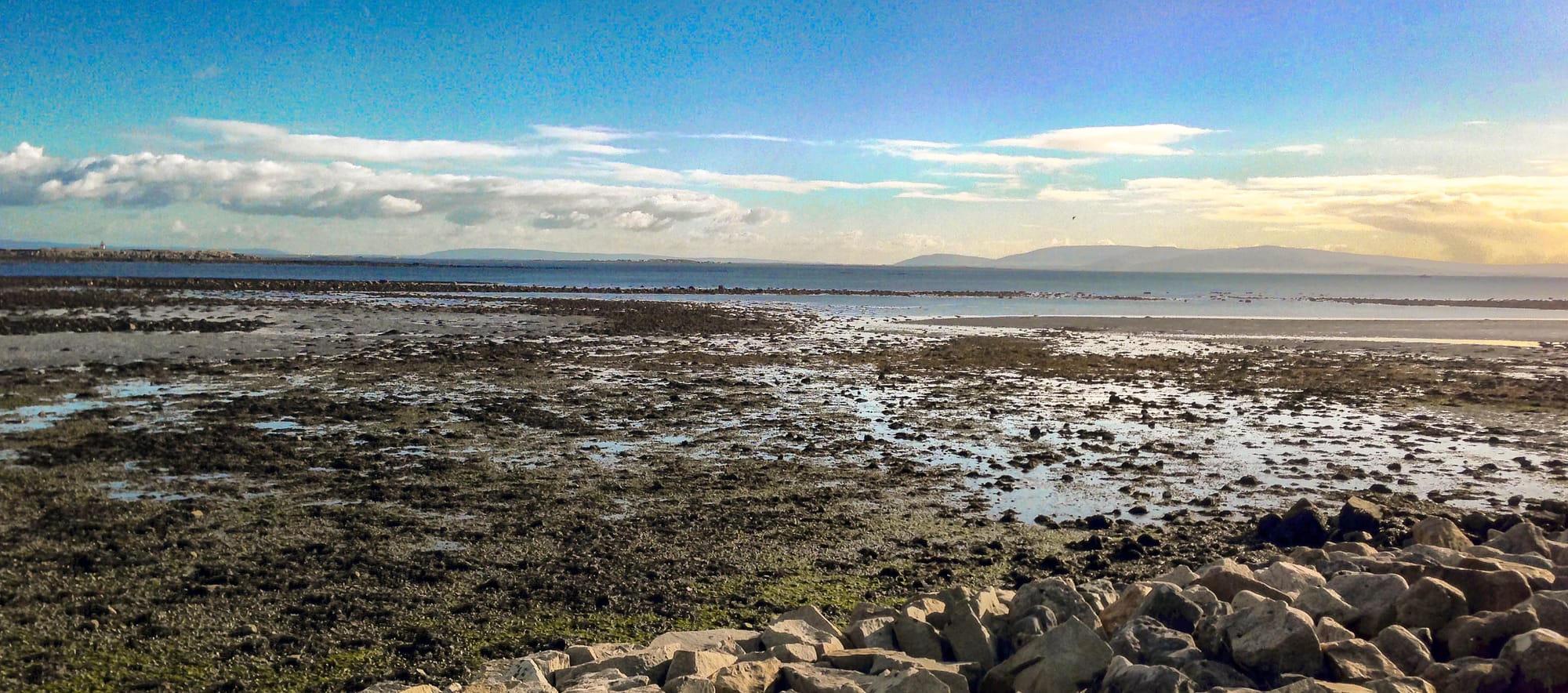
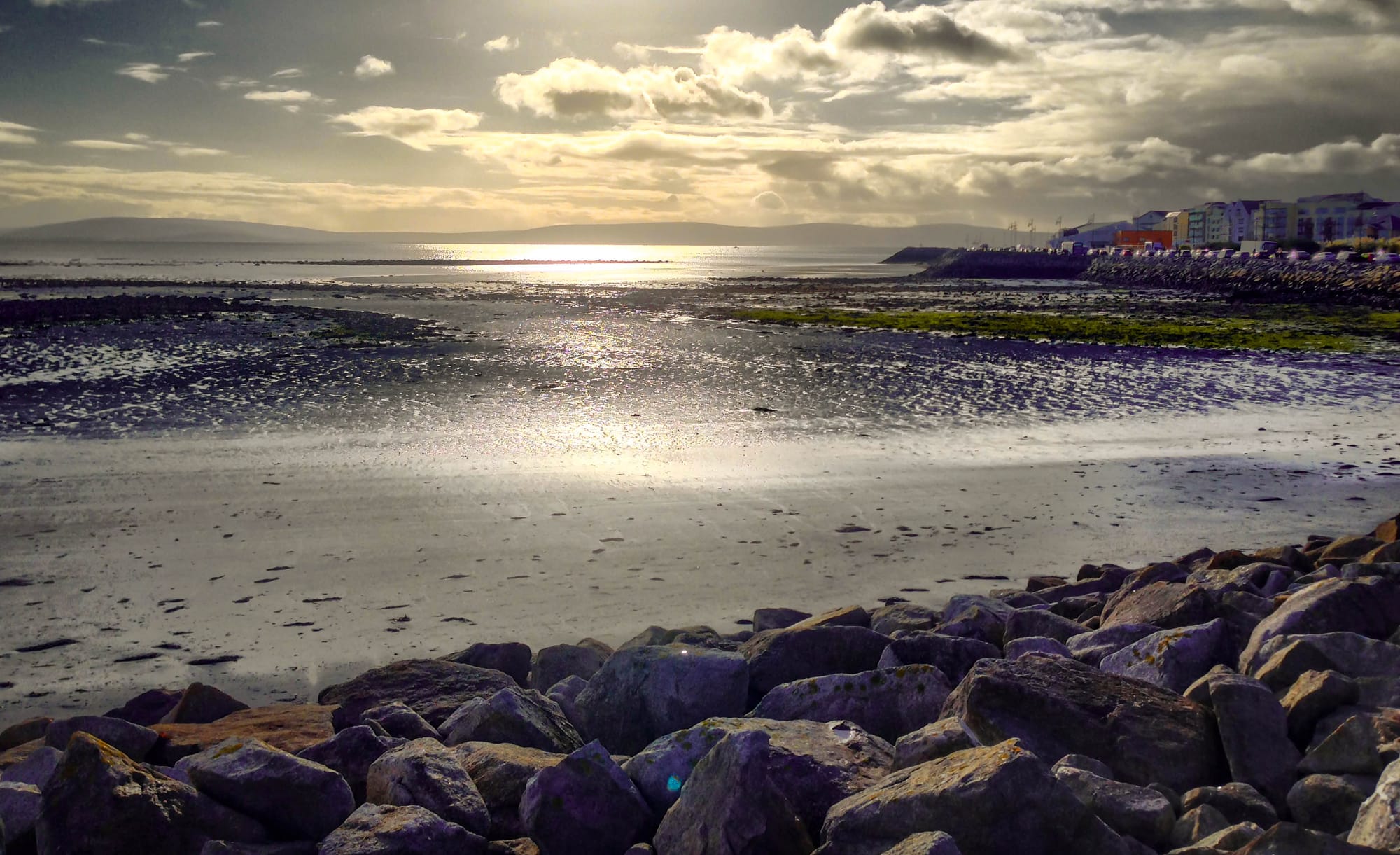
Galway, 2016.
“It’s at least two hours!” She said like it should, obviously, settle things. “Maybe three.” It could be argued that my smile was too patronizing. She shook her head and left, her short hair trembling as she went.
“I think we’ll go today then.”
Roads in Ireland, like everywhere in the UK, are divided into three categories. Motorways are just like our highways except for the driving-on-the-wrong-side bit; regional highways are not twinned or lit at night; and city streets make you hate your life. Actually, that’s a lie. There are four categories. The last one, the one they call “roads,” is the best. Or worst, depending on how much you care about personal safety. They’re about half the width of a standard North-American driveway. They snake through the countryside with no speed limit posted. Or rarely. Which usually means 80km/hr. It’s a fine speed when you’re alone on the road and the visibility is good, which happens roughly never in Ireland. These asphalt snakes twist and turn and hug mountainsides and what have you without the slightest hint of a shoulder or guardrails to keep you from hurtling to your death. However there are plenty of stonewalls and hedges close enough to scratch the paint off your vehicle. These roads are the most fun to drive, except of course when you’re bickering with your companion about whether or not you’re good and truly lost.
“Wait, why is this my fault?”
“All I’m saying is, it happens every time.”
“That’s not an answer and you know it. Besides, every time you use ‘every time’ in an argument you’ve already lost it.”
Awkward moment of silence.
“Do you think we’ll find a Starbucks on the way?” he asked. I should consider myself lucky that he doesn’t like to keep arguing once he’s lost.
“I wouldn’t bet on it.”

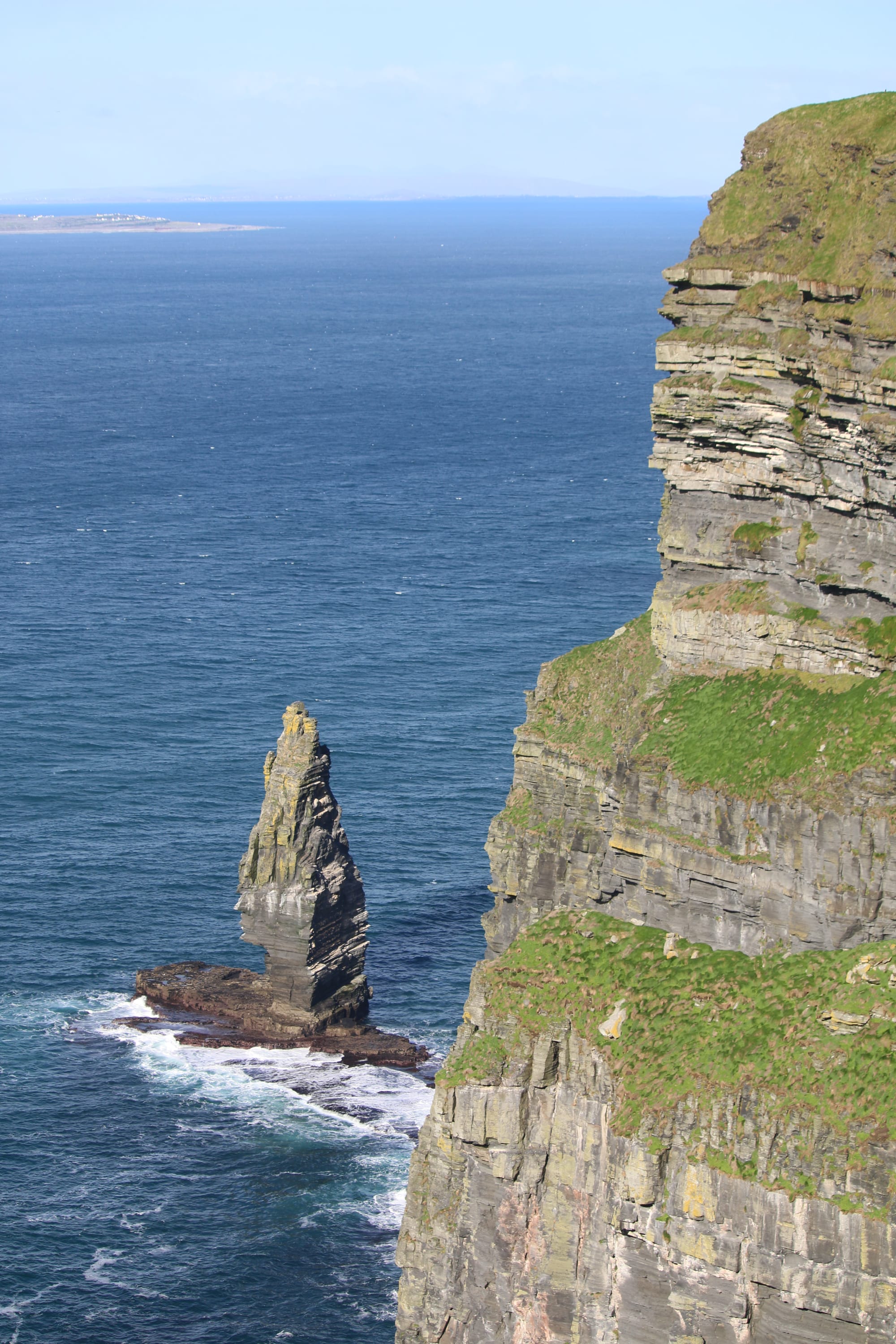
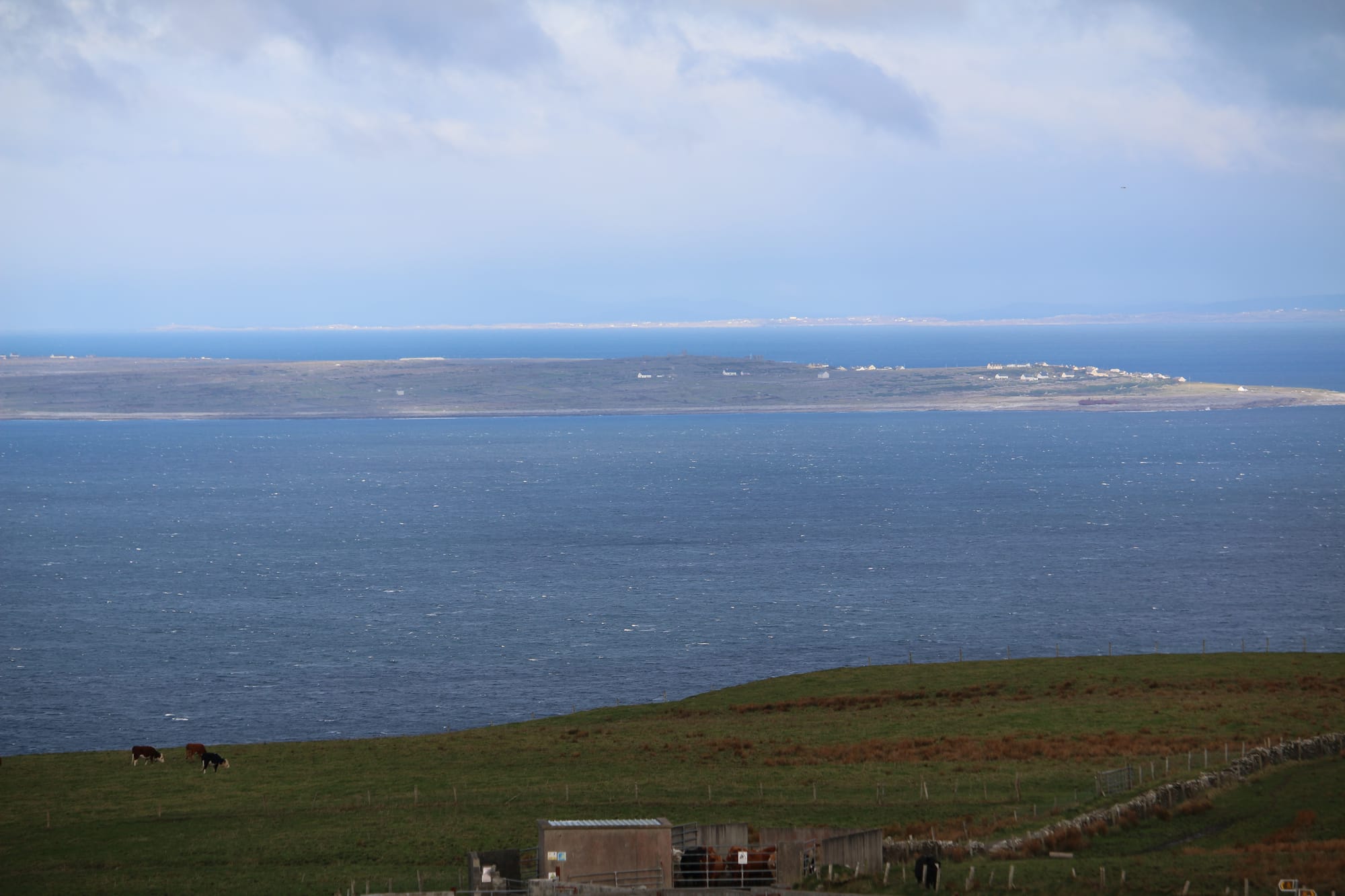
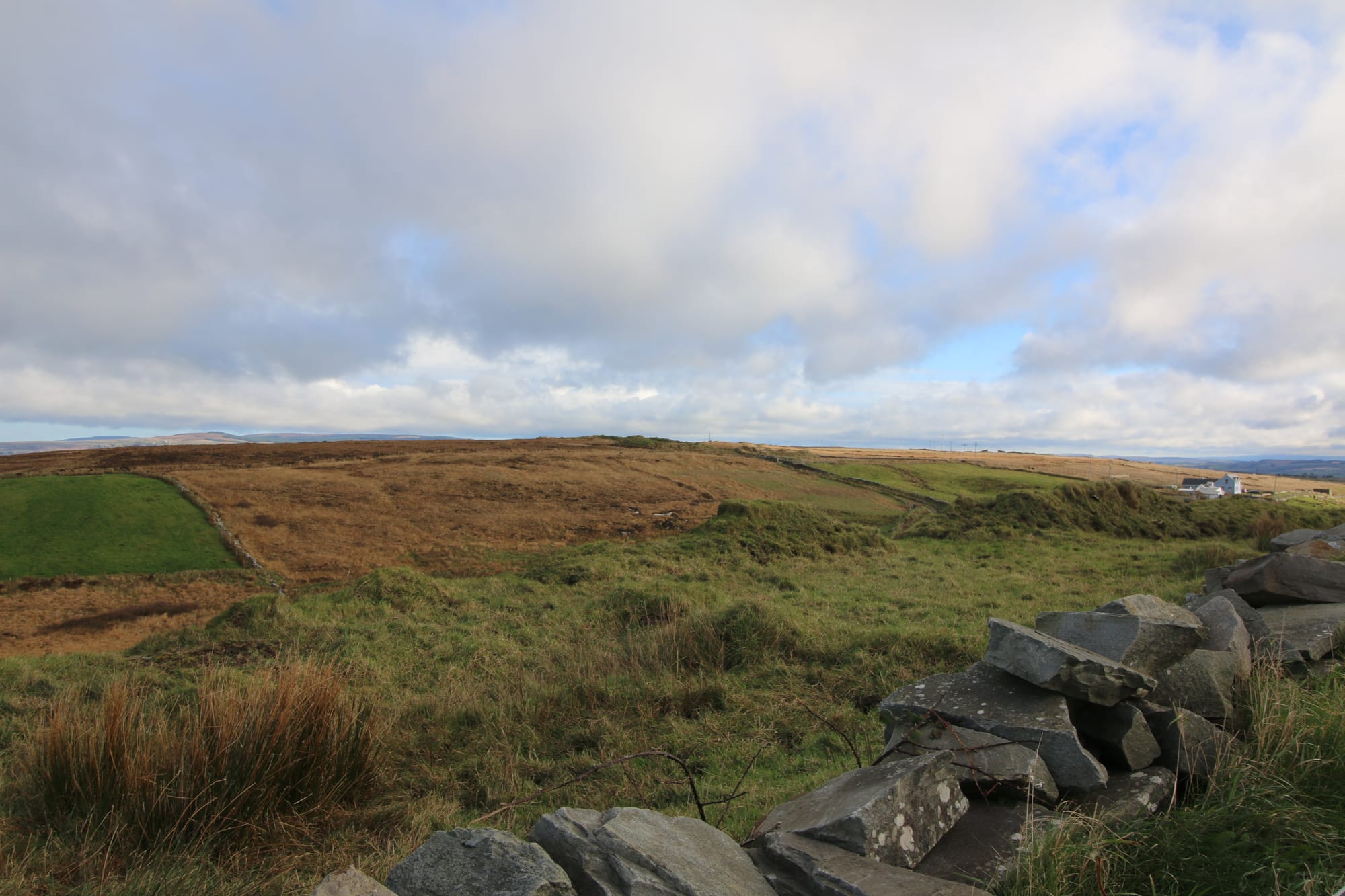
We eventually reached the Cliffs of Moher. It was easy in the end — they were the last thing before the Atlantic Ocean. It’s like you can’t miss them. “Can you believe how weirded out Kate was? It was not even three hours. Not worth curdling the custard over.”
The car park was nearly empty, just a few other vehicles. We parked, crossed the road (no, there are no pedestrian crossings; good luck) and found our way to the shop that doubles as visitor centre and restaurant. Not that you need tickets. You can walk right off the cliff if that’s what you want. The Irish are nothing if not permissive.
“People die here often?” he asked of the security attendant who was armed with nothing more threatening than a walkie-talkie and a truly impressive key ring.
“All the time,” he replied, not a trace of emotion in his voice and his face resolutely scanning the horizon like he was hoping to see someone wave at him from Newfoundland.
There are probably as many ways to describe the Cliffs of Moher as there are shades of light in the sunrise, so I’ll just say this: It’s not a good place to realize your fear of heights is a real thing. The Cliffs are roughly seven million feet above the crashing waves of the Atlantic Ocean, and in keeping with local traditions, there are no guardrails. You can walk right up to the edge and contemplate your impending mortality without anyone batting an eye. Not even the security guard.
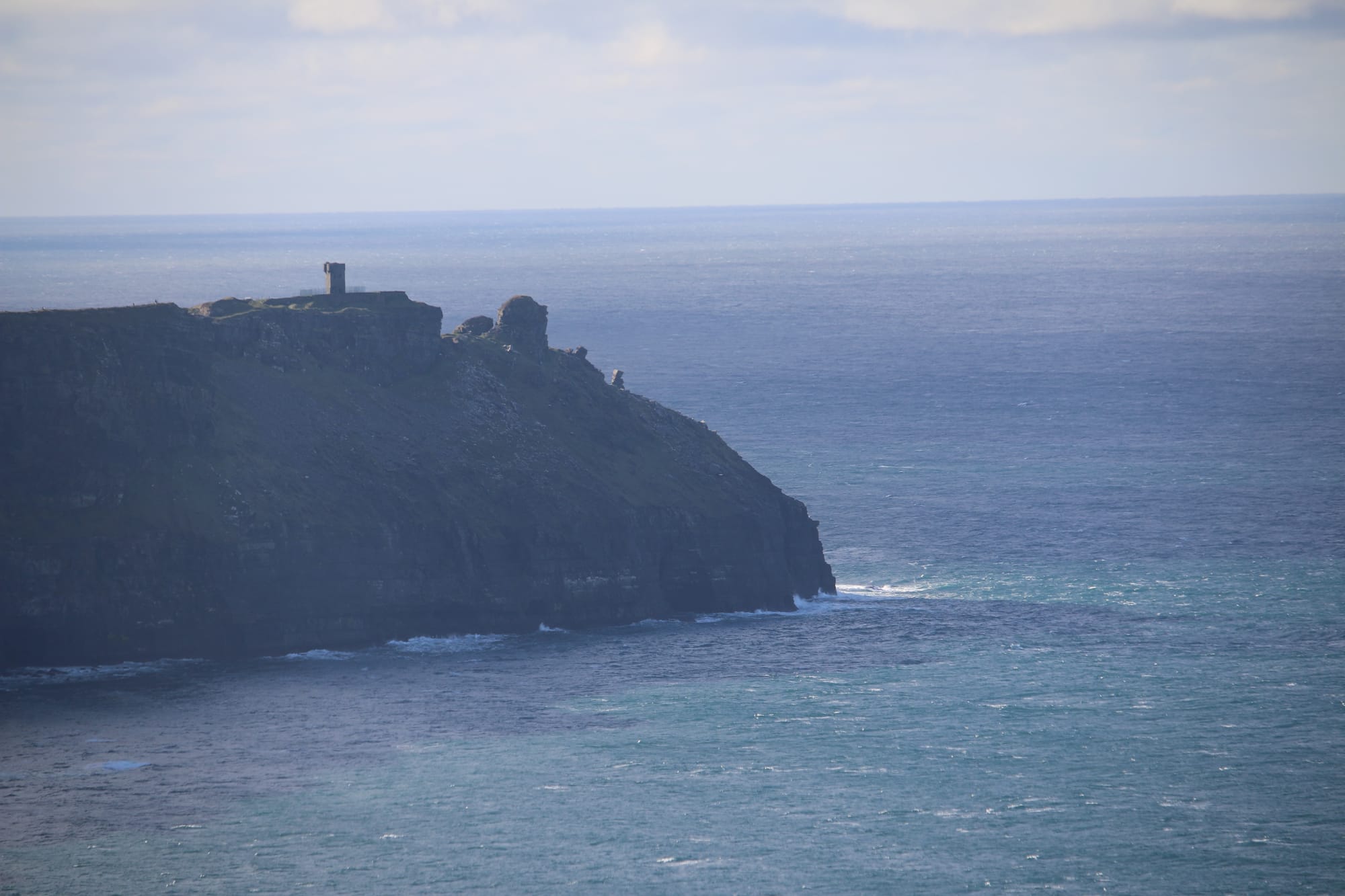
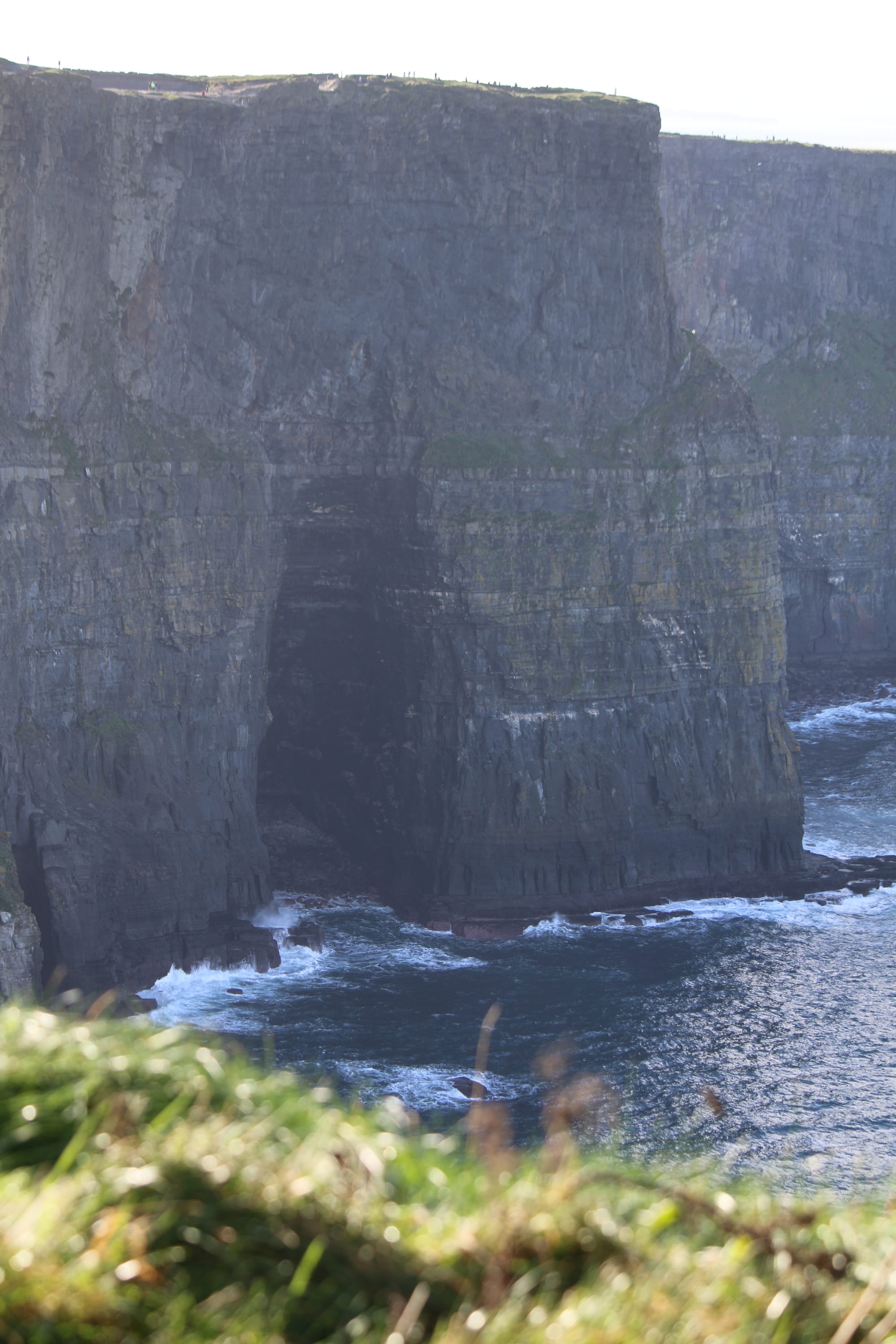
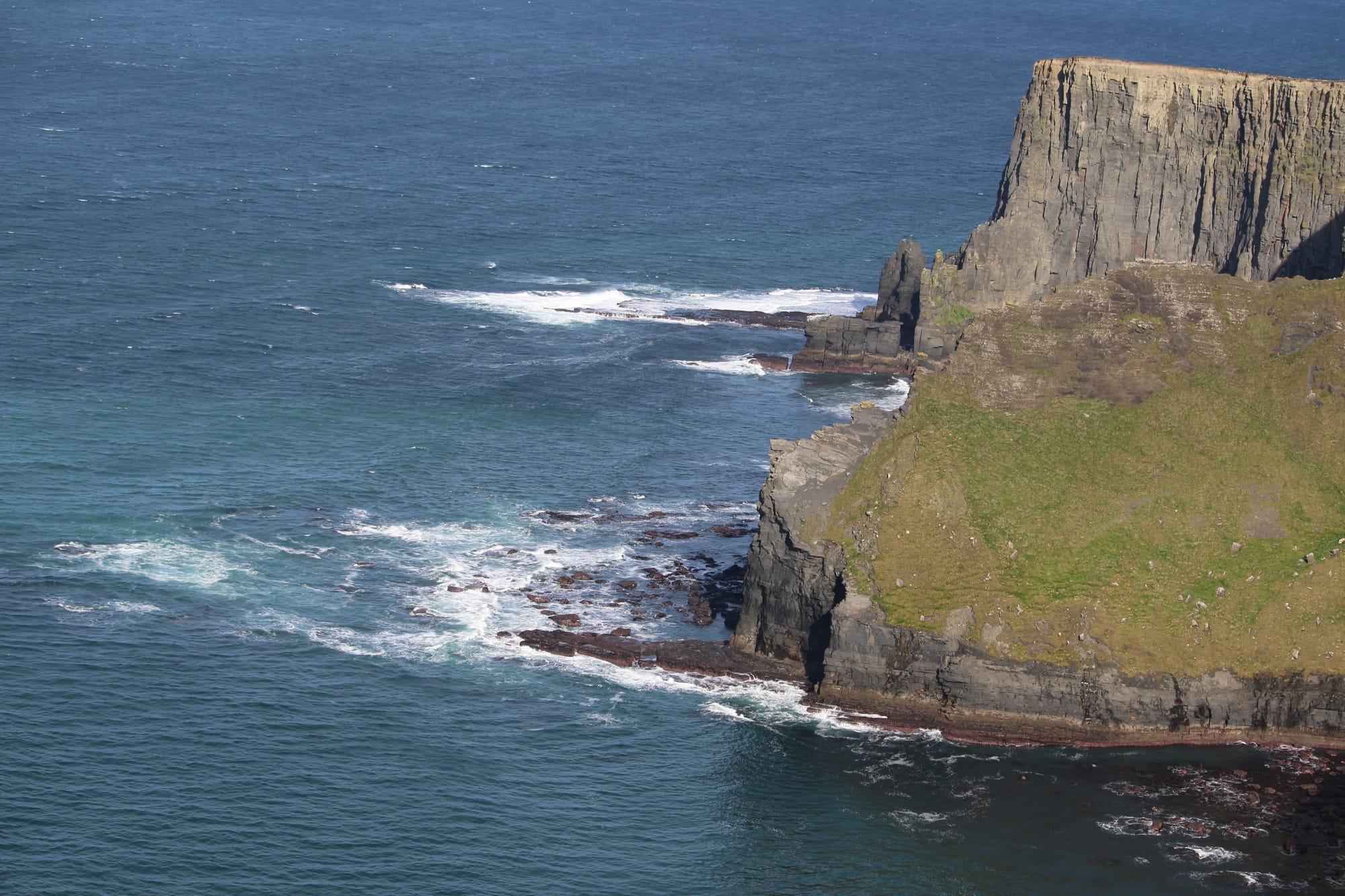

We left the Cliffs of Moher and most of our breath behind, with the firm intention to reach Galway to the north, following the coastal road. On the map, at least, it looked pretty close.
That day I learned maps can lie. Or at any rate omit critical information, such as just how much the west coast of Ireland twists and turns on a road entirely devoid of everything including room. On one side, the sea. On the other, endless cliffs. In between, all the cows in the republic. I like cows. They’re so… I don’t know. Peaceful. They force you to slow down with they big wet eyes. They quietly take their place, without asking for anything more than that except for something to chew on.
“Watch out!!!” I had to swerve onto the lack of shoulder to narrowly avoid a head-on collision with some moron in a blue Vauxhall who evidently believed this stretch of “highway” was his alone. One’s relationship to space is heavily dependent on where one was raised. Obviously this fellow/moron was used to not having any. Comfort zone in this part of the world means about four inches. Me, I was shaking. You do get used to driving in these conditions. On a few previous trip to the UK I drove all over everywhere for eight hours a day for well over a week. By about day 3 I was motoring like a local. We hadn’t been in Ireland 24 hours. I wasn’t ready for Mr. Moron.
Jet lag is insidious like the maritime air that gets under your zipped-up jacket to remind you who’s boss, before you even get a chance to notice it’s there. But at least the roads were clear, if you exclude the notable exception that almost made a pancake out of two bleary-eyed tourists. And the infernal tour buses that took up way more than their share of pavement especially when the road was winding this way and that, which was nearly always.
Always. Every. Oh, bother.
“Admit it, you’d be miserable right now if we were stuck on a bus with tourists.”
“We are tourists.”
“But we’re not boring. Or loud. Also not on a bus. With a car, we have freedom to go wherever we want, and to change our minds 16 times on the way. And part of the way. Or even after the way.”
“I get it.”
“You make it sound like it’s a bad thing.”
“How long until we get there?” The man can change subjects faster than a moody sky changes colour. No, really. The heavens above the quiet surf went from blue-with-fluffy-clouds to grey and drizzly to a green that was nearly luminescent and back to blue again with disconcerting speed. It made our trip feel like a week-long excursion. That and the tragic shortage of public toilets.
“I don’t know. The map says we should be here but I think Google is lying. This road really twists and turns, eh?” He made that face.
One of the fun things about traveling in the UK is that for all you know your destination is right around the next bend. Towns and hamlets in this part of the world have a tendency to just appear as if out of nowhere. Galway, however, was somewhere in between. Not a big town by any stretch of the imagination, but too big not to be seen from a certain distance. In North America, you always know when you approach an agglomeration. There are gas stations where two minutes before there were vast expanses of nothing, the a few slightly sad-looking strip malls before you reach either a gun shop or a Starbucks, and of course the inevitable big-box craft store just before the McDonald’s.
“Notice how there aren’t any sidewalks?”
“You’re exaggerating again. There are some. They’re just small.”
“Those are curbs.” Again with the face. I’d been craving coffee and also a loo for over an hour. Since the Cliffs, actually. I don’t know why, but I always have to pee again the minute I leave some place for another. Galway was so close on the map, it was maddening to think the cartographers had simply neglected to add all the empty space we were motoring through.
“Why is it that you can cross the entire country twice in one day but those to tiny, super-close dots on the west coast are a million miles apart from one another?!” It was a plea disguised as an accusation. We clearly hadn’t taken the wrong road, seeing as they was only one. There was no one to blame for this predicament, which made it a lot worse. We weren’t lost. We were just alone in the universe. Well, us and those stupid tourist buses. Didn’t they know this road led nowhere?
The salty breeze from the sea would have been lovely in warmer weather. In November you really understood why old people always went around wearing three layers of ugly wool sweaters. The air chilled you right down to the bone.
“I like that you’re not nervous about my driving,” I said as a way of distracting me from my alarming need to urinate. “I do enjoy being on the wrong side of the road, did I ever mention that?”
“Since the last time you said it, or just generally?”
I tried to ignore the snark. “I mean, it’s great. Sure, the roads are narrow. But look at how people manage to manoeuvre them without dying by the hundreds. People drive way better here than in North America where we just have too much room for our own good. We have the space to be stupid.”
“I know people who can be stupid in a closet.”
Clearly, my sales pitch was falling on deaf ears. “I think at this point I’ll stop—”
“Didn’t you just say that?”
“No, it’s been half an hour. I checked.” He laughed but what I heard was pain. “What a funny country. There are houses here with cars in their driveways. People live here. But there aren’t any stores or restaurants. Where do they go for food and gas?”
“Petrol. And notice we’re on a highway?”
“Eh?” Anyone would understand his confusion. Whatever we were on did not look like a highway.
“I know, right? But it says so, right there on the sign,” I added, pointing at it. “Wild Atlantic Way.”
“Way, not Highway.”
“It means the same thing. Anyway, I hope it doesn’t get much wilder than that. We’re almost out of gas.”
“Petrol.”
“So what do they call a street here,” he asked after a few minutes to break the icy silence that had descended into our car’s interior straight down from Planet PissedOff. “Dirt tracks?”
“Maybe we should ask someone when we stop at a place that sells coffee or tea or anything, really,” I said through clenched teeth.
“We’ll ask them why there are cows on the beach, too.”
You’re not supposed to take your eyes off the road when you’re driving, but come on. Like Lot’s wife, I craned my neck to peer into the distance behind me, despite all common sense to the contrary.
“Why didn’t you say anything earlier?”
“You weren’t talking to me then.”
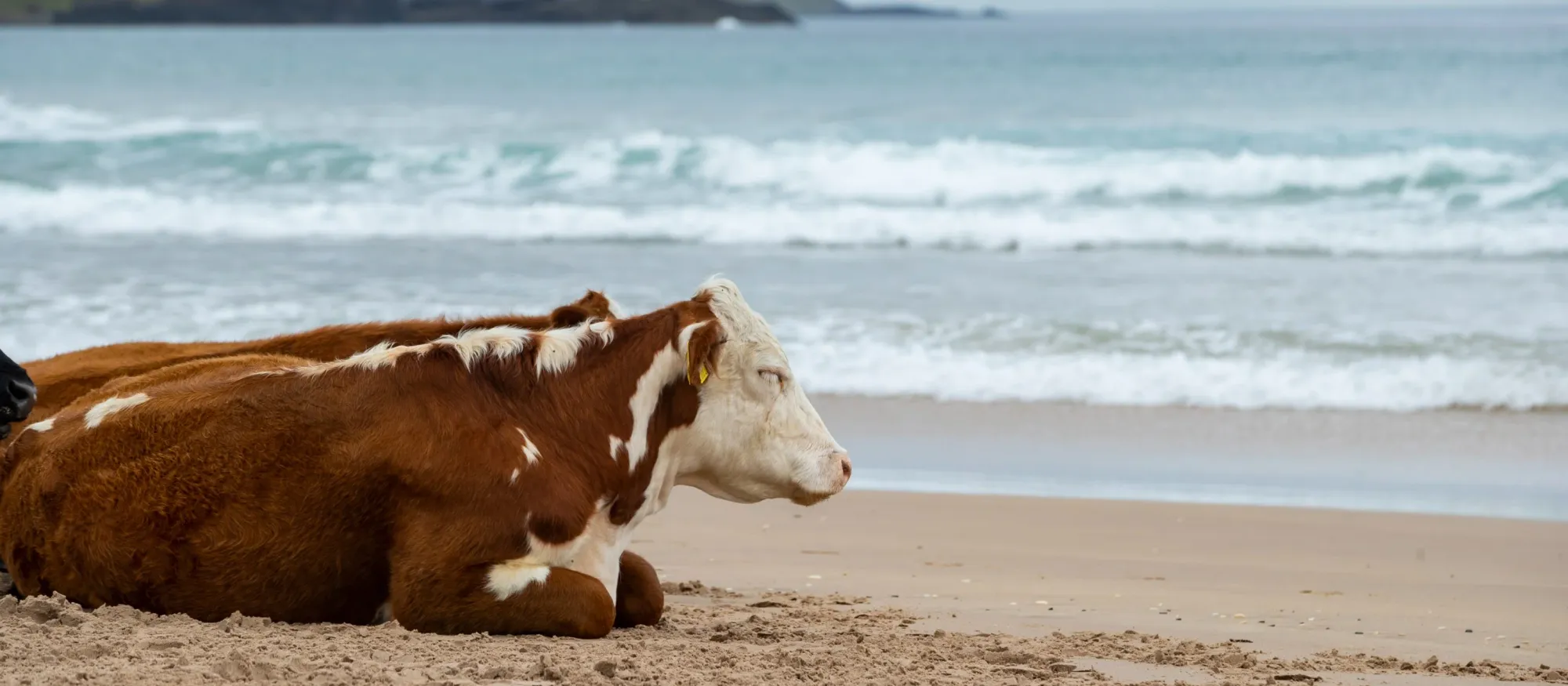
Sure enough, true as the sun in the sky, right between the road — way, whatever — and the Atlantic Ocean, right there on the beach were cows staring at the surf like their cousins everywhere else around the world look at trains. I considered cracking a joke about this being the sensible thing to do when visiting the beach but no, this story isn’t a police procedural so I restrained myself. Cows. There were cows. On the beach.
“Never seen that before,” I stammered. “And I’ve been around.”
“Maybe they’re lost?”
“No, I think we are.”
We never found coffee. Or tea. Or anything else for that matter except for petrol and a couple of airline-sized peanut packets. Then we hit the motorway — the real highway — that would take us back to Dublin in a jiffy to that civilization came back in the form of fast food outlets and, blessedly, flush toilets. “Just wait until we tell Kate in the morning,” I said. “She’ll never believe it.”
